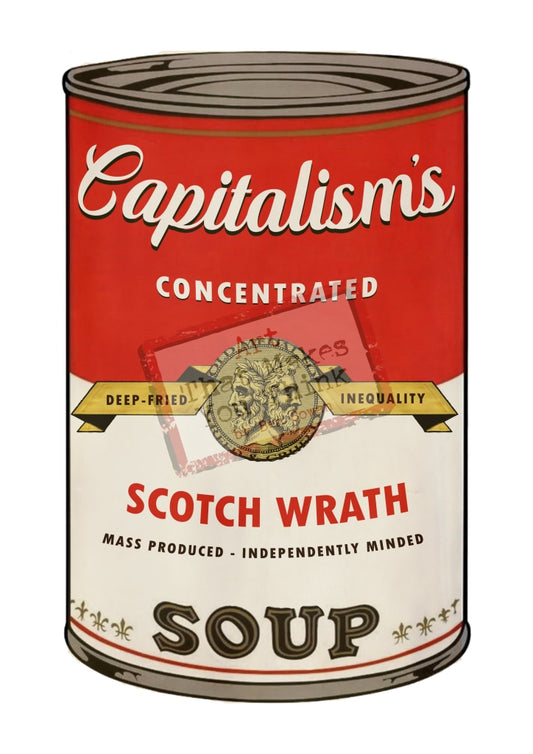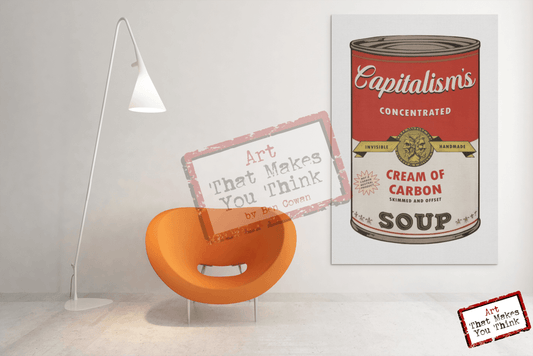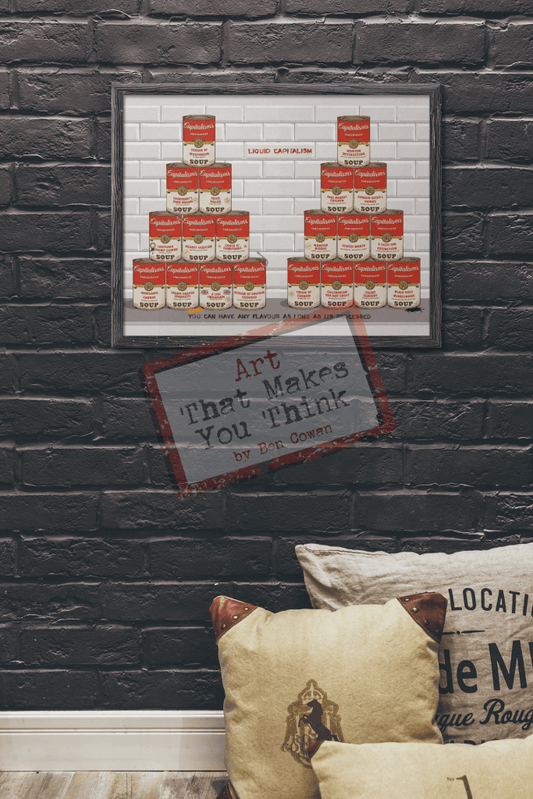Surveillance Capitalism Soup Cans

Later in the 1960s, Andy Warhol developed his Campbell's soup can range, by introducing label and can damage versions; in the 70s, he experimented with different colours in grids. With dual lenses of irony and satire, it is 'surveillance capitalism' that is in my cross-hairs, and now the colour-scheme has turned Matrix-fluorescent green and black.
The Wachowskis totemic sci-fi film, The Matrix is a key inspiration. Which is why in the centre of the Campbell's can format, instead of Janus the two-headed Roman god, I have placed Neo. In the film, this is before Keanu Reeves - the human battery - is unplugged into 'reality'.
As I see it, we have a red pill - blue pill choice whether we our have heads-down, looking at our phones while crossing the road, or our heads-up sensing the beauty of nature, while walking through the park. If people were to realise the impact - for the future of humanity - of sharing all our data, our very imaginations; would we be willing, or able, to 'unplug'?
In my art collection image above, I have subverted that stop-and-think quote from Morpheus in the first Matrix film, "Do you really think that is air that you are breathing now?" inflected through the Rene-Magritte surrealist question, "Do you think these are soup cans?" The cans offer a chance to go beyond soup (imagine...), which is to use the iconic format to comment on and better understand what is going on in the third modernity. "Do you really think that's soup you're eating now?" Every time you surf web and don't pay for it, then you are the product. Or rather as Shoshana Zuboff writes, "you are not the product, you are the dismembered carcass." Where, with extreme indifference, the ivory-hunters steal the most valuable commodity - the tusks - and leave the rest behind. In this case, the hunt is for our personal data, we are the elephant, the tusk is the ‘behavioural surplus’ generated from what we do online, and the hunters are the surveillance capitalist corporations.
In 2019, Shoshana Zuboff wrote her towering non-fiction book, coining the term Surveillance Capitalism for its title. This seminal work is regarded to be as important in revealing the new frontier of surveillance capitalism as Adam Smith’s Wealth of Nations in 1776 was to understanding the means of capitalised production. Smith described for the first time, how capitalism developed in the crucible of the industrial revolution. Similarly, Zuboff brilliantly explains, how surveillance capitalism represents an unprecedented escalation. Capitalism commodifies and monetises nature for financial gain, where surveillance capitalism secretly mines and exploits human beings for their very imagination, before encoding and selling our lives as their proprietary data to generate unprecedented profit and power globally.
In my Liquid Capitalism soup can collection, I wrote, 'You can have an flavour, as long as it's processed'. This time, we are the soup; and it is our minds that are being processed.
Think twice before you open a can of heavily processed soup. Think twice before you download an app. Think twice before you allow your kids to voice-activate a smart speaker. Think twice before you strap on a fit-bit ahead of a run. Think twice before you accept a piracy - sorry - ‘privacy’ policy. Think twice before you buy a ‘SMART’ thermostat, internet-enabled toy, or any other data-harvesting tool developed by surveillance capitalist firms, such as Google, Meta and Baidu.
As Socrates once declared, 'know thyself'. We better do, at least better than the algorithms do. Otherwise, in our elephant graveyard, in T.S. Eliot's The Waste Land: 'this broken jaw of our lost kingdom', we will go out, not with a bang, but with a whimper.
[Insert Joke].
Ben Cowan
Art That Makes You Think





